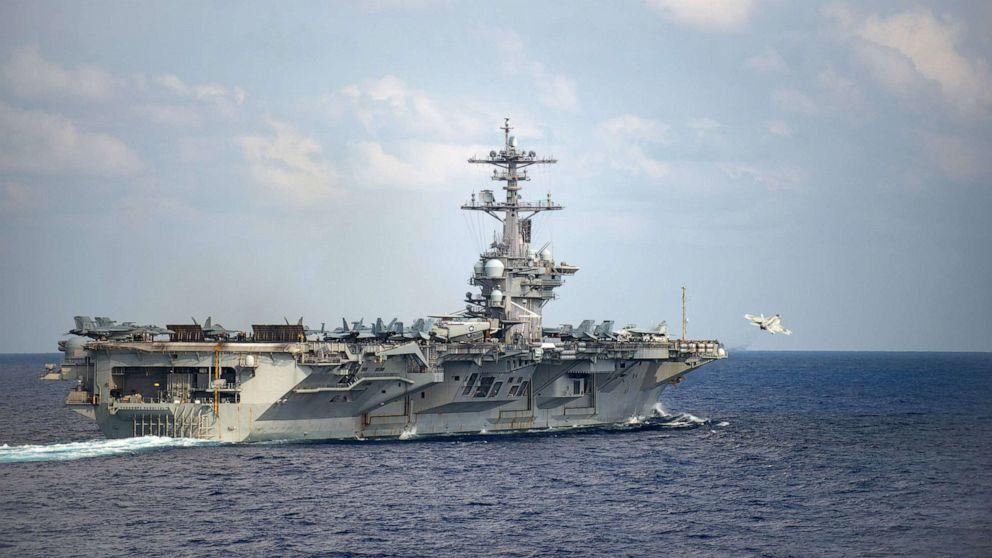In an astounding plea for help, the captain of the nuclear aircraft carrier USS Theodore Roosevelt has urged top command of the US Navy to take drastic action after more than 100 sailors aboard the ship have been infected with the coronavirus.
More than a week ago it started with a handful of COVID-19 cases, which by the end of the week spiked to 36, causing the West Pacific-deployed carrier to dock at a naval station at Guam, ordering infected crew members out of the some 5,000 total into makeshift quarantine facilities, including a basketball gym hastily transformed for that purpose. The San Francisco Chronicle has obtained and published excerpts of an unprecedented plea for help written by the USS Roosevelt’s Captain Brett Crozier to Pentagon leadership:
“This will require a political solution but it is the right thing to do,” wrote Capt. Brett Crozier, a Santa Rosa native, from Guam where his 1,092-foot carrier Theodore Roosevelt docked following a COVID-19 outbreak. “We are not at war. Sailors do not need to die. If we do not act now, we are failing to properly take care of our most trusted asset — our Sailors.”

In the letter Capt. Crozier warned that “Due to a warship’s inherent limitations of space… the spread of the diseast is ongoing and accelerating.” The SF Chronicle described that the letter was issued Monday as the captain fears there will be possible deaths among crew under his command if more resources aren’t immediately allocated.
It is unclear as yet how many of the crew have been quarantined on land at Guam, and how many still remain aboard the docked carrier. But it appears the ongoing attempts at quarantine and containment are not going fast enough, with less than necessary resources employed. Previously General John Hyten, the vice chairman of the Joint Chiefs of Staff, said testing of the entire crew is expected to take a week minimum.
Crozier further urgently requested “compliant quarantine rooms” on shore in Guam for his entire crew “as soon as possible”. He added, “Removing the majority of personnel from a deployed US nuclear carrier and isolating them for two weeks may seem like an extraordinary measure… this is a necessary risk.”
He outlined specific dangers of large amounts of the crew remaining on board the ship as follows, according to the SF Chronicle:
The tight quarters on the carrier are “most conducive to spread,” he wrote, including large amounts of sailors in a confined space, shared sleeping quarters, restrooms, workspaces and computers, a common mess hall, meals cooked by exposed personnel, and movement constraints requiring communal contact with ladders and hatches.
The criticisms are aimed at the current strategy of merely moving the numbers of infected and immediate exposures off the ship, while increasing social distancing and disinfecting measures for the majority still on the ship, which he called “ineffective”.
I’ve never seen anything like this.
Captain of Theodore Roosevelt pens a four-page letter pleading for resources, says the situation is rapidly spinning out of control as nearly 200 sailors test positive: https://t.co/OZuJwAQi46
— David B. Larter (@DavidLarter) March 31, 2020
And in perhaps the most unexpected and stunning section of the letter, the captain takes the unprecedented step of pointing out to top brass that focus on battle-readiness in this case will actually lead to potential significant loss of life:
If the Navy focuses on being battle ready, it will lead to “losses to the virus,” Crozier said. The second option, the captain recommended: “Achieve a COVID-free TR.” Methodically clean the ship, while isolating the crew in port with a massive amount of individualized lodging equipment.
The captain’s recommendation is to instead keep only 10% of the crew on board at any given time in order to initiate deep sanitization procedures and crucially to operate the reactor plant, according to the letter.
No doubt the captain’s letter was not meant to go public, especially given America’s enemies and rivals are surely watching very closely. After all it took an ‘invisible enemy’ in the form of a virus infecting over 100 sailors to essentially knock out of commission an entire nuclear aircraft carrier.